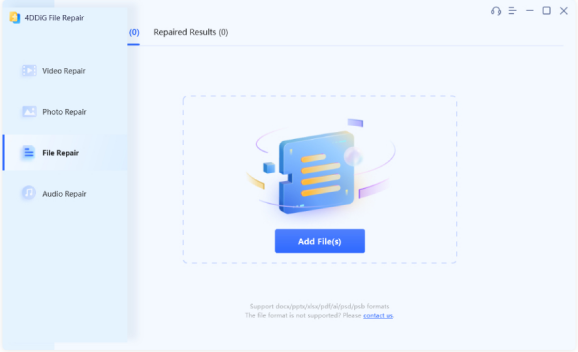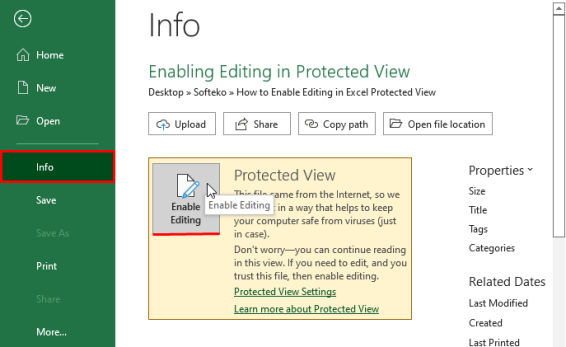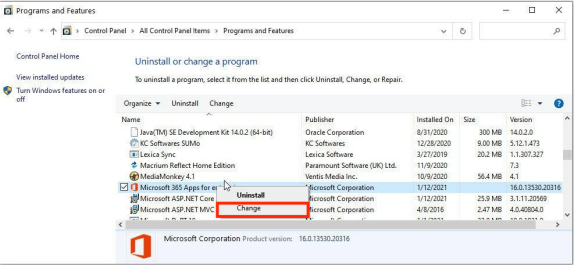
Have you ever encountered the error message ‘File Couldn’t Open in Protected View’ when trying to open an Excel file? It can be a real headache, especially when you’re working on an important project with a tight deadline.
In most cases, you can resolve this issue by simply closing all open Excel files and exiting the Excel application. However, in this article, we’ll provide 6 additional solutions to get back your work and provide insights into the reasons behind this error. So, read till end!
Part 1: Why Does the ‘File Couldn’t Open in Protected View’ Error Appear?
Protected View is a security feature in Microsoft Office applications designed to safeguard your computer from potential harmful content within files. Several reasons could trigger the “File Couldn’t Open in Protected View” error:
- Your file may come from an untrusted or unsafe source, such as the internet or an email attachment.
- This file may contain potentially suspicious content or macros.
- The file itself may be corrupted due to some reasons.
- If your Office software is not up-to-date, it might not recognize newer security features.
Part 2: Preparation before Fixing the ‘File Couldn’t Open in Protected View’ Error
If you receive the error message ‘Excel The file couldn’t open in protected view,’ the first step is definitely to check whether the file is corrupted. 4DDiG File Repair, a powerful and user-friendly tool, can help you repair damaged or corrupted MS files with just a few clicks. Whether you are unable to open MS office files or encountering blank content, 4DDiG File Repair boasts an exceptionally high success rate in resolving these issues. In addition, it also supports repairing multiple documents at once, greatly saving users time and effort.
Here’s how to fix damaged MS office files with the help of 4DDiG File repair:
Step 1: Launch the 4DDiG File Repair tool on your Windows or Mac. Navigate to the “File Repair” section and add your corrupted MS files by clicking on the “Add File(s)” button.

Step 2: Initiate the repair process by clicking on “Start Repair.” The tool will then scan and resolve any issues preventing the MS file from opening normally.

Step 3: Once the scanning is complete, preview the repaired files to ensure their integrity. If you are pleased with the content, select the files you need and click on “Export Selected to save them.

Part 3: 6 Ways to Fix the ‘File Couldn’t Open in Protected View’ Error
Solution 1: Disable Protected View
Another workaround to fix the ‘File couldn’t open in protected view’ error is to temporarily disable the Protected View feature. However, you must make sure that the file you’re trying to open is 100% safe before changing the Trust Center settings. Here is how:
Step 1: Open your Excel and click on “File” in the top-left corner. Then, select “Options” at the bottom of the left-hand menu.
Step 2: Navigate to “Trust Center” > “Trust Center Settings…” > “Protected View.”
Step 3: Uncheck the options under “Protected View” and click “OK” to apply the changes.

Solution 2: Try a different way to open the file
If the error ‘Excel file couldn’t open in protected view’ persists, using an alternative viewer can be a viable option. For instance, you can upload the problematic Excel file to Google Drive and attempt to open it with Google Sheets. LibreOffice also serves as an free alternative for opening and editing Excel files. It is perfectly compatible with Excel files and offers a range of features similar to Microsoft Excel.
Here are some popular spreadsheet software alternatives:
- WPS Office Spreadsheets
- Zoho Sheet
- Aspose.Cells Excel Viewer
- Gnumeric
Solution 3: Enable Editing
You can also resolve the ‘Excel couldn’t open in protected view’ issue by enable editing. Once you’ve enabled this option, the document will be unlocked, and you’ll be able to make changes, save the document, or perform any other actions as needed. Also, only do so if you trust the source of the document. Follow these steps:
Step 1: Open the problematic Excel file. A yellow bar may appear at the top of the document with a message similar to “Protected View.”
Step 2: Look for and click the button on the yellow bar that says “Enable Editing.”

Step 3: Finally, confirm your decision by clicking “Yes.”
Solution 4: Unlock the Problematic File
When you download a file from the internet or receive it from another computer, Windows may mark it as potentially unsafe due to its origin. That’s why the error message ‘the file couldn’t open in protected view’ pops up. By unblocking the file, you’re able to tell Windows that you trust the file’s source. To do so, follow these steps:
Step 1: Right-click on the file you want to unblock. Then, select “Properties” from the menu.
Step 2: You might see an ‘Unblock’ checkbox. If it’s there, check the box and then click on “Apply.”

Solution 5: Convert the File Format
In online Q&A forums, some experienced Excel users share that they are able to resolve the ‘Excel file couldn’t open in protected view’ issue by converting the file format.
If the problematic file is in the older .xls format, you can consider converting it to the newer .xlsx format. Conversely, if the file type is .xlsx, copy and paste it into a blank Excel document. Then, open the pasted file as an icon.
Solution 6: Repair or Update Microsoft 365
If none of the above methods can solve the ‘Excel the file couldn’t open in protected view’ problem, this is likely because your Microsoft Office installation is corrupted or outdated.
Repair Microsoft 365:
Step 1: Press Windows+R together and type “Control.” Then, hit Enter to open Control Panel.
Step 2: Navigate to “Programs” and then to “Programs and Features.”
Step 3: Locate and select “Microsoft Office” in the list. Next, click on the “Change” option.

Step 4: A window will appear with options to repair Office. Click on “Repair” to proceed.

Update Microsoft 365:
Step 1: Launch any Office program and click on “File” in the top left corner.
Step 2: Click on “Account” on the left sidebar.
Step 3: Click on “Update Options” and select “Update Now.”

Conclusion
Tackling the “File couldn’t open in protected view” error might seem like a puzzle, but with these 6 straightforward solutions, you’re well on your way to overcoming it. We strongly recommend starting with simple fixes, such as opening the problematic Excel file with Google Sheets or disabling the Protected View feature directly. If you want to learn more about repairing damaged Excel files, take some time to read this comprehensive guide.
Interesting Related Article: “How to Record A Microsoft Teams Meeting Effortlessly 2023?“

![Fixed: the File Couldn’t Open in Protected View [2024] Fixed: the File Couldn’t Open in Protected View [2024]](https://marketbusinessnews.com/wp-content/uploads/2023/12/intro.png)






